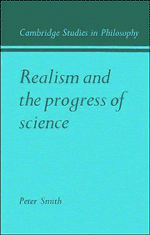Summary
I began Chapter 1 by explaining how an impasse had been reached in contemporary discussion of the problem of scientific progress. This arose from the relativist's challenge to the accounts of progress afforded by positivism and falsificationism. Central to this challenge is the claim that the terms of competing or successive theories are incommensurable, i.e., that there is in principle no way of showing that they mean the same. This shift from what has been traditionally regarded as a problem in the philosophy of science to a problem in the philosophy of language determined the content of the later chapters.
My aim has been to explicate and defend a realist account of the progress of science. Peculiar to this account is a thesis not about meaning but about reference, namely that competing or successive theories are usually about the same things. I have maintained that a necessary condition for making sense of this thesis is a theory of reference for scientific terms. This explains the nature and order of what I characterized as ‘four questions for realism’:
(1) How can we compare the extensions of relevant natural kind predicates from different scientific theories?
(2) How can we discover which objects belong to the extension of a natural kind predicate as that predicate is used within a linguistic community?
(3) What conditions have to be satisfied by a natural kind predicate “ϕ” and an object a in order for “ϕ”, as it is used within a linguistic community C, to be correctly applied to a?.
[…]
- Type
- Chapter
- Information
- Realism and the Progress of Science , pp. 125 - 129Publisher: Cambridge University PressPrint publication year: 1981



